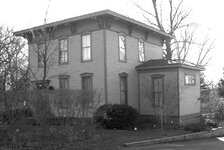
Preserving historic homes and buildings is, generally speaking, a good thing. Individuals, foundations, and organizations do it all the time—often without incentives or oversight from any level of government. But when preservationists wield political power over property owners, good intentions don't always have positive outcomes.
In 1970, the Michigan Legislature passed PA 169, a law that permits local governments to regulate changes to property in designated historic districts. The idea, apparently, is that public oversight will ensure historic preservation of private property. In 1996, Midland created its "West Main Street Historic District," an area incorporating 24 properties and including homes originally constructed as early as 1874. To those of us living in the district, the results have ranged anywhere from a considerable waste of time to what one resident describes as "the worst thing I've ever experienced in my life."
One of my neighbors is an 85-year-old woman who has lived in her home for 35 years. She found working with the Historic District Commission (HDC) so distressing that she decided to live with the ongoing damage caused by roof leaks rather than seek approval for correcting the problem. "I will let my house fall down before I deal with those people again," she commonly says. Score one for the history police, but not for history.
At a recent City Council meeting, several district residents told story after story of how ridiculous, costly, time-consuming, and intimidating it is to apply for a "Certificate of Appropriateness" from the HDC to improve their homes. Observers learned that the HDC is under no obligation, and makes no attempt, to advise or assist property owners. The burden is on the owner to prove that any proposed improvement is historically accurate, even when no historic evidence exists. Decisions by the commission are often perceived as arbitrary, arrogant, petty, and even vindictive. People who were once amicable neighbors now spy on one another, reporting possible violations to the HDC. The list goes on and on.
At the same meeting, HDC members' response, in a nutshell, was to reaffirm how important they are and how hard they work. It is true that the commissioners have long meetings. They do discuss and approve work. They certainly follow up on "unapproved changes." There is no doubt that they are busy. Unfortunately, there is not a single bit of evidence that they are effective. They failed to demonstrate how their stated objectives are advanced by what they actually do. The commissioners did not recount a single situation where, had it not been for the HDC, some of Midland's vital history would have slipped away forever.
The HDC is meant to prevent "bad things" from happening. But these "bad things" are extremely unlikely in a district like ours. This is due to the value of our property, which is largely related to the historic significance of our homes—and that value had risen substantially before the HDC was formed. As happens with antique cars, the value of homes goes down as they age, bottoms out, then begins to rise as the surviving specimens of a certain era become rare. It is true, as HDC supporters warn, that many old homes have been demolished or remodeled beyond recognition. But that's what makes the ones that remain in good condition so valuable. And that's what makes it economically worthwhile to restore and preserve homes that still have potential.
People cannot be forced to preserve the history in their property. Restoration and preservation are possible only by individuals putting their own money, sweat, blood, and tears behind their passion for history. The best defense against erosion of historic value is to educate property owners that it is in their best interests to preserve the historic significance of their homes. This does not require the force of government.
The beautiful city of Marshall in south-central Michigan is proof that preservation is possible without government intervention. Marshall's famous historic district has developed based on voluntary cooperation of property owners, many of whom rejected a recent attempt to impose a commission-based district under PA 169.
The problems in Midland may or may not characterize other commission-based historic districts. But clearly such problems can be avoided by making the preservation of historic private property a voluntary educational project rather than a political issue.
#####
Paul Arends is a contributing writer for the Mackinac Center for Public Policy. Michael LaFaive is a policy analyst with the Mackinac Center. Permission to reprint in whole or in part is hereby granted, provided the authors and their affiliations are cited.

The Mackinac Center for Public Policy is a nonprofit research and educational institute that advances the principles of free markets and limited government. Through our research and education programs, we challenge government overreach and advocate for a free-market approach to public policy that frees people to realize their potential and dreams.
Please consider contributing to our work to advance a freer and more prosperous state.